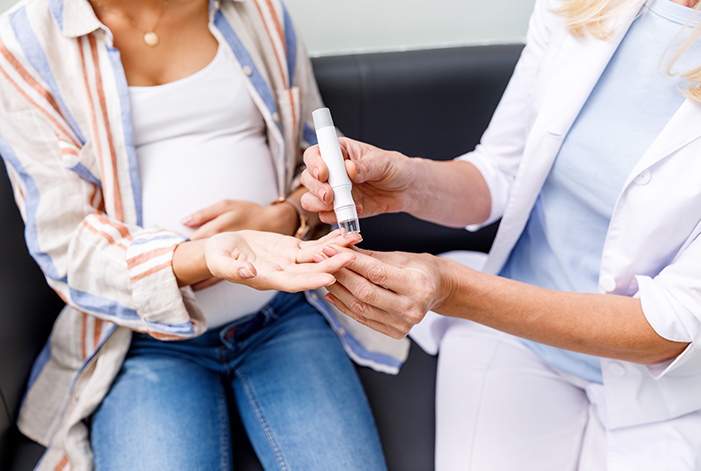1-Hour Glucose Tolerance Test in Pregnancy & Should I Fast?
What is 1-Hour Glucose Tolerance Test | Fasting before the Test | How is the 1-Hour Glucose Tolerance Test Performed | Why is the 1-Hour Glucose Tolerance Conducted | Interpreting the Glucose Test Results
What is a 1-Hour Glucose Tolerance Test in Pregnancy & Should I Fast? Let’s cover all you need to know! Pregnancy is a time of profound happiness and anticipation for expectant mothers, but it comes with potential risks. Proper prenatal care is crucial to ensure the health of both the mother and the baby. One of the standard procedures doctors recommend is the 1-hour glucose tolerance test during pregnancy, also called the GTT.
GTT checks for gestational diabetes, which develops during pregnancy and goes away after. It occurs when the body cannot produce enough insulin to manage the increased glucose levels during pregnancy. According to the Centers for Disease Control (CDC), gestational diabetes affects 2%-10% of pregnancies in the US. [1]
According to the American Diabetes Association (ADA), pregnant women should undergo a 1-hour glucose tolerance test between the 24th and 28th weeks of pregnancy. [2]
This article will provide a comprehensive guide to the 1-hour glucose tolerance test during pregnancy, including the importance of a GTT during pregnancy, how to prepare for the test, and why it is conducted.
What is 1-Hour Glucose Tolerance Test?
A 1-hour glucose tolerance test is a routine screening test to detect gestational diabetes. The test measures your body’s ability to metabolize glucose (sugar). Higher-than-normal glucose levels in your blood mean you have gestational diabetes, a form of diabetes that occurs during pregnancy.
GTT is generally conducted between the 24-28th week of pregnancy. This is because gestational diabetes develops in the later stages of pregnancy, around the 24th week, when the body is less sensitive to insulin, a hormone that regulates blood sugar levels. The heightened insulin resistance increases the demand for glucose, affecting the body’s ability to process glucose effectively.
Elevated blood sugar levels can have severe consequences for the mother and the baby. If left untreated, gestational diabetes can lead to several complications, including preterm labor, preeclampsia, and macrosomia, to name a few.
The 1-hour glucose tolerance test is a critical screening tool that helps doctors identify women at risk of developing gestational diabetes, allowing for timely intervention and management.

Do I need to Fast before the 1-Hour Glucose Tolerance Test?
No, there’s no need for fasting before the 1-hour glucose tolerance test, it is a non-fasting test, and you can continue with everyday food on the days before the GTT. However, you may be asked to avoid certain foods before the test to ensure accurate results. For example, sugary or starchy foods could interfere with the test results.
The 1-hour glucose tolerance test is a simple process, and there’s nothing much you can do to prepare other than follow the instructions given by the health care provider. Depending on your circumstances, you may receive specific instructions to follow leading up to the test. It is essential to follow these instructions carefully to ensure accurate test results.
You may also want to bring some snacks with you. Some pregnant women may feel shaky or lightheaded after the blood draw.
How is the 1-Hour Glucose Tolerance Test Performed?
According to the American College of Obstetricians and Gynecologists, all women should be screened for gestational diabetes. So, the chances are that your healthcare provider will recommend a 1-hour glucose tolerance test during pregnancy.
The 1-hour glucose tolerance test is simple but requires a sweet tooth. First, you must drink a sugary drink containing 50 grams of glucose. Keep in mind that you should finish the drink quickly.
Your phlebotomist will draw your blood at the one-hour mark from when you consumed the drink to check your blood glucose level. More importantly, you have to remain relatively sedentary during the test. Fasting blood glucose and fasting blood sugar level measurement is not required, as its a non-fasting test.
What Should You Expect During the Test?
The 1-hour glucose tolerance test is a simple and relatively quick test that can help diagnose gestational diabetes. In saying that, the test itself can be slightly uncomfortable or unpleasant. The glucose drink is a sweet, syrupy liquid, so some women may experience nausea or vomiting after drinking it.
After drinking the glucose solution, you will wait one hour before your blood is drawn. You will be asked to remain seated (or sedentary) during this time. Furthermore, you should also avoid eating or drinking anything other than water.
Remember that the 1-hour glucose tolerance test is a screening test, not a diagnostic one. If the glucose test results indicate that your blood glucose levels are higher than usual, your healthcare provider will likely recommend a follow-up test.
Risks
The 1-hour glucose tolerance test is safe and has no risks or side effects. However, some women may feel nauseous from the sweet solution they drink before the oral glucose tolerance test.
As for the blood draw, there’s little risk involved aside from the usual lightheadedness. Taking a blood sample varies from person to person, and some may require multiple punctures to locate the veins.

Why is the 1-Hour Glucose Tolerance Conducted?
The one-hour glucose test is conducted between 24-28 weeks of pregnancy to screen for gestational diabetes. It may also be advised earlier if you are at a higher risk for diabetes or have had previous pregnancies with gestational diabetes.
The risk factors for gestational diabetes are:
- Your ethnic group has a high risk of diabetes
- You have a parent, child, or sibling with diabetes
- You are older than 25 and are obese
- You have had a previous pregnancy with complications
Importance of Early Detection of Gestational Diabetes
Early detection of gestational diabetes cannot be stressed enough. It allows healthcare providers to implement appropriate management strategies to keep the mother and baby healthy throughout pregnancy and delivery.
Here are some reasons why early detection is essential:
- By detecting gestational diabetes, you can reduce the risk of complications during pregnancy and delivery.
- High blood sugar levels in the mother can affect fetal development and lead to congenital disabilities and other complications.
- Uncontrolled gestational diabetes can increase the mother’s risk of developing type 2 diabetes later in life.
- Women with gestational diabetes may require more frequent prenatal visits, additional ultrasounds, and other interventions to monitor the health of the mother and baby.
Potential Risks of Untreated Gestational Diabetes
If left undiagnosed and untreated, gestational diabetes can have severe implications for the health of the mother and baby. [4] These include:
- Macrosomia: Gestational diabetes can cause the baby to grow large, weighing 9 pounds or more. They will likely end up in a c-section due to their birth weight.
- Hypoglycemia: Babies born to mothers with gestational diabetes may experience low blood sugar levels and require special care in the neonatal intensive care unit. Severe episodes can result in seizures.
- Preterm birth: High blood sugar levels can increase the risk of pre-term delivery (before 37 weeks of gestation).
- Type-2 diabetes: Gestational diabetes may induce type-2 diabetes in both the mother and baby later in life.
- Pre-eclampsia: This is a life-threatening condition usually characterized by high blood pressure.
Interpreting the Glucose Test Results
The one-hour glucose tolerance test measures your body’s response to a sugary solution. If your body has difficulty processing glucose, it could be a sign of gestational diabetes. The normal range for the glucose screening test is equal to or less than 140 mg/dL (7.8 mmol/L) 1 hour after drinking the glucose. [3]
If your blood glucose level is higher than 140 mg/dL, chances are that you are at risk of gestational diabetes. Therefore, you will require further testing, such as the three-hour glucose tolerance test.
A blood glucose level of 190 mg/dL or higher in the GTT indicates that you have gestational diabetes. And further testing may not be needed.

What Happens Next?
When you are diagnosed with gestational diabetes, your healthcare provider will work with you to check your blood sugar levels. This may include dietary changes, exercise, and regular monitoring of your blood sugar levels.
In severe cases, your healthcare provider may also prescribe insulin. Moreover, you will likely have follow-up testing to monitor your blood sugar levels throughout pregnancy.
Working with your healthcare provider and following their recommendations can ensure a healthy pregnancy and delivery for you and your baby.
Wrapping Up – Preparation and fasting required?
The 1-hour glucose tolerance test is essential for detecting gestational diabetes during pregnancy. The test is relatively simple and involves drinking a glucose solution, followed by a blood test to measure blood sugar levels at the one-hour mark. Remember, you do not need to fast before taking this test.
Early detection and treatment of gestational diabetes are crucial to reducing the risk of complications for both the mother and baby. Gestational diabetes can be managed with a healthy diet, exercise, and sometimes medication.
If you are pregnant, it’s essential to work with your healthcare provider to understand your risk of gestational diabetes and take steps to manage your blood sugar levels.
See more articles below you may enjoy:
Need an APP on your Mobile to help with Fasting? See our Top 6 FREE and Premium Fasting Apps


